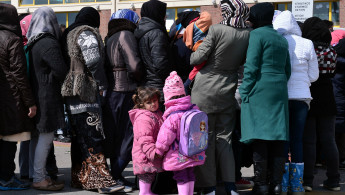Canada looks to export refugee resettlement system
The Global Refugee Sponsorship Initiative gathered in Ottawa to discuss Canada’s private sponsorship programme, which allows groups of five Canadian citizens or more to sponsor a refugee family and provide financial support to meet their basic needs in their first year in Canada.
Representatives from the UK, US, New Zealand, Chile, Argentina, Australia, Brazil and Germany attended the conference, Canada’s Citizenship and Immigration Minister, John McCallum, said at a press conference this week.
The Canadian government is hoping to take the lead in helping interested countries create and implement their own private sponsorship system to help the global refugee crisis, McCallum said.
 |
The Canadian government is hoping to take the lead in helping interested countries create and implement their own private sponsorship system to help the global refugee crisis |  |
More than 1.19 million refugees are expected to be in need of resettlement in 2017, according to the United Nations High Commissioner for Refugees (UNHCR).
The agency intends to submit 170,000 resettlement applications next year, but “the gap in terms of needs remains great,” it said.
“There are not enough countries receiving enough refugees to solve the problem, to put it mildly,” McCallum said.
“If we can induce other countries to consider adopting our privately sponsored, refugee programme, that could make a difference."
Response to Syrian crisis
Canada’s private sponsorship programme came into the spotlight this year after tens of thousands of Syrian refugees were resettled in the country.
Of the more than 37,000 Syrians resettled in Canada since November 2015, nearly 13,500 were sponsored by private organisations – including churches, synagogues, mosques and community groups – and individuals.
More than 20,000 others received government support, while almost 4,000 were resettled under a private-public blended visa programme.
Canada holds sponsorship agreements with community groups across the country. This enables these organisations to sponsor refugees themselves, or help individuals within their communities do so.
Groups of five adults – all Canadian citizens or permanent residents – may also sponsor refugees.
In effect, private sponsors are responsible for helping refugees settle into life in Canada and they must raise funds to support refugee families in their first year in the country.
This is not always easy and it does not come without its own set of challenges.
To sponsor a refugee family of four in Canada, private sponsors must generally raise at least $30,000 for that first year.
 |
To sponsor a refugee family of four in Canada, private sponsors must generally raise at least $30,000 for that first year |  |
Sponsors must find accommodation for the family, buy furniture and clothes, help parents and children enrol in school and English-language courses, and aid in locating employment opportunities. They also make sure families sign up for provincial healthcare coverage, and find them a doctor and dentist, if necessary.
Despite an outpouring of popular support to resettle Syrian refugees, private sponsorship groups have also been frustrated by long wait times before families arrive in Canada.
In its year-end, human rights report card, Amnesty International Canada said the government’s response to the Syrian refugee crisis “stands as one of the few bright-spots in a world that has offered minimal resettlement opportunities to Syrian refugees”.
Ottawa should demonstrate leadership on the refugee file in the coming year, Amnesty said, “by maintaining generous levels of resettlement in Canada and working with other governments to encourage them to increase their resettlement commitments and capacity”.
History of the programme
Canada’s private sponsorship programme was spearheaded in response to another refugee crisis in the mid-1970s.
At the time, Vietnamese civilians were fleeing the bloody Vietnam War in great numbers. Dubbed Vietnamese “boat people,” a few thousand were resettled in Canada before the government decided to offer a new plan to expedite the resettlement process.
Ottawa pledged in 1979 to admit 50,000 refugees to the country. Private corporations, local community groups like churches, and groups of five or more Canadian citizens could also sponsor the refugees directly.
“By July 1979, flights full of refugees started arriving in Canada every three days,” the Canadian Broadcasting Corporation (CBC) reported.
At the end of 1980, about 60,000 Vietnamese citizens had been resettled in Canada, and a few years later, the United Nations awarded the people of Canada the Nansen Refugee Award for their collective resettlement efforts.
Complimentary assistance
According to Jennifer Bond, a law professor at the University of Ottawa, the project does not aim to produce carbon copies of Canada’s private sponsorship scheme, but rather build programmes that are specific to other countries’ social and economic capacities.
“The objective is not to take Canada’s programme and assume it will succeed in other places as it’s currently constructed,” she said. “It’s about taking our best practices and then supporting states as they adapt them to meet their own needs.”
Bond said tapping into Canada’s 30 years of experience on this file could be beneficial.
“I think the critical thing here is not what those differences are, but what the similarity is, and that is the compassion that exists in communities around the world. We need to find ways to tap into that compassion as part of the global response to the crisis,” she said.
Meanwhile, Johannes Van Der Klaauw, UNHCR’s representative in Canada, encouraged countries to consider private sponsorship as a way to compliment their government assistance for refugees.
 |
Private sponsorship by ordinary citizens … shows how individuals are engaged for refugees to create that welcoming society which today we need more than ever |  |
“Private sponsorship by ordinary citizens … shows how individuals are engaged for refugees to create that welcoming society which today we need more than ever,” Van Der Klaauw said.
“This is another way to promote the integration of refugees and to have this so-called whole of society approach to the settlement and integration.”


![President Pezeshkian has denounced Israel's attacks on Lebanon [Getty]](/sites/default/files/styles/image_684x385/public/2173482924.jpeg?h=a5f2f23a&itok=q3evVtko)





